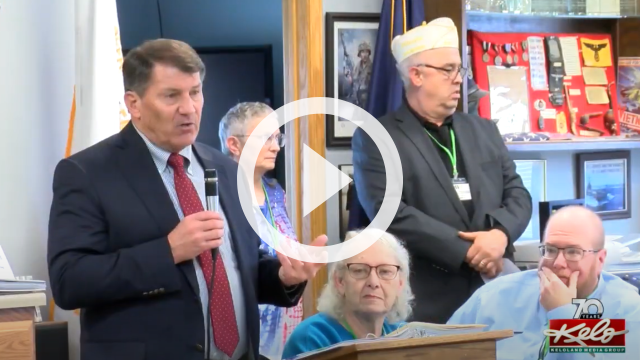Weekly Round[s] Up: May 8-14, 2023
We had a short week out in DC this past week, but we packed as much as we could into a few days! There were fewer South Dakotans visiting DC this past week – you all must not want to visit anymore now that the weather has gotten nice back home! Can’t say I blame you, especially as we reach the hot and humid summer here in DC. That said, we’d love to have you out here any time. We’ll even give you a tour of the Capitol. Despite your absence, we were still working for you with other meetings, classified briefings and reintroducing a piece of legislation that has a big impact on Native American veterans. Here’s my Weekly Round[s] Up:
South Dakota groups I visited with: Grace Powell, South Dakota’s finalist for the national Poetry Out Loud competition. Grace is a junior at Dakota Valley High School in North Sioux City, South Dakota.
Meetings this past week: NATO Deputy Secretary General Mircea Geoan?; Kelly White, CEO of Lifesource; Representatives from the General Aviation Manufacturers Association and coffee with Bret Baier from Fox News. I had the opportunity to visit with Dr. Scott Gottlieb, former Food and Drug Administration (FDA) Commissioner, about artificial intelligence (AI) and the role it could have in curing diseases like cancer.
We also had our Senate Prayer Breakfast, where Senator Mike Lee from Utah was our speaker this week.
I also spoke at an event hosted by the Nonproliferation Policy Education Center and the American Bar Association, where we discussed the harms of overclassifying intelligence documents. Overclassification negatively impacts our military and weakens our ability to provide congressional oversight and accountability. Fear of being blamed for releasing sensitive security information has led officials to be overly cautious and classify information to an unnecessarily high level. Additionally, there are an excessive number of guidebooks, which aid officials in determining the proper level of classification. Currently, there are over 2,000 of these guidebooks and nearly 1,500 officials who are authorized to classify documents. This has led to vague and conflicting guidelines. It’s necessary that we begin to automate the classification and declassification process; however, it will not be effective if we do not first reform the classification guidelines to be consistent, clear and concise.
Topics discussed: As predicted, we talked a lot about the debt ceiling this past week. Not much has changed since my report last week. We are still expecting that President Biden and congressional leadership will come to an agreement before a default occurs.
Our southern border was also a topic of discussion this week with the end of Title 42, a section of the U.S. Code dealing with public health that originally dates back to 1944. A portion of Title 42 was utilized as part of the public health crisis designation in March of 2020 at the beginning of the pandemic to allow law enforcement to turn away those attempting to enter our country illegally to prevent the spread of COVID-19. Before this, migrants who were waiting on asylum hearings were allowed to remain in the US, creating unsafe conditions and putting a strain on resources in our border cities. This creates a huge security risk for not only our border states, but the entire country. I discussed Title 42 in full on SDPB with Lori Walsh. You can listen to that clip here.
Votes taken: Four – two of these votes were on nominations, and two were congressional resolutions of disapproval seeking to overturn policies put in place by the Biden administration.
Hearings: One – I spent all of Wednesday afternoon in a hearing with the Senate Select Committee on Intelligence.
Classified briefings: Two – our biweekly cyber education session and a Senate Armed Services Committee Strategic Forces Subcommittee briefing.
Letter to Secretary Blinken: My colleague Sen. Joe Manchin (D-W.Va.) and I sent a letter to Secretary of State Antony Blinken urging the Department of State to hold China accountable for its role in the illegal trafficking of synthetic opioid drugs. China is the primary source of the precursor chemicals, which are then processed and manufactured into synthetic opioids by Mexican drug cartels to bring into the United States. Since Biden took office, 35,375 pounds of fentanyl have been seized or smuggled across the southern border. You can read more about that letter here.
Legislation introduced: I reintroduced legislation to create a congressional charter for the National American Indian Veterans (NAIV) organization this past week. Congress grants charters to recognize patriotic and national organizations that operate solely for charitable, literary, educational, scientific or civil improvement purposes. According to the Department of Veterans Affairs, there are more than 140,000 Native American veterans in the United States. While congressional charters have been granted to Italian-American, Polish-American and Catholic-American veterans groups, as of today, no Native American veterans’ organization has received one. You can read more about this legislation here.
As you may recall, this legislation unanimously passed the Senate last November; however, the House did not take it up for a vote before the end of the 117th Congress in January. I’m looking forward to getting this passed in the Senate and hopefully into law before the end of the 118th Congress in 2024.
My staff in South Dakota visited: Lead and Rapid City
Steps taken this week: 61,400 steps or 28.35 miles.
Video of the Week: I talked more with Keloland about the National American Indian Veterans charter this past week. You can watch the clip in this story to hear from Don Loudner, a 93-year-old Korean War veteran from Mitchell:
